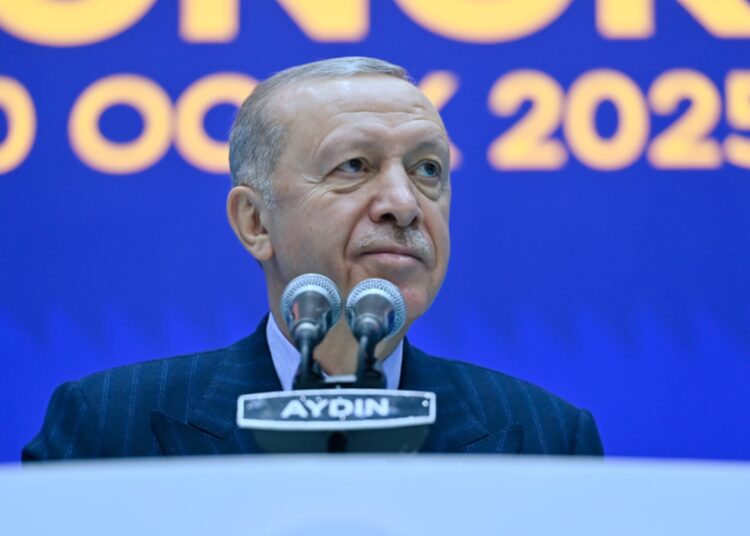Abdullah Bozkurt/Stockholm
The involvement of Turkish government officials in aiding and abetting a notorious organized crime family, which operates in drug trafficking and illegal online betting from the breakaway territory of northern Cyprus in the eastern Mediterranean, has been thrust into the public spotlight as the political opposition has, albeit belatedly, raised the issue in public discourse.
At the heart of this massive scandal, which implicates top Turkish officials, are revelations from an accountant for a slain Turkish drug trafficker who had been indicted in the United States. The exposé paints a damning picture of how the government of President Recep Tayyip Erdogan has enabled the laundering of illicit funds generated through drug trafficking, organized crime and illegal online betting operations based in northern Cyprus, which is effectively controlled by Ankara.
The revelations made by Cemil Önal, an accountant who worked for the Falyalı family between 2014 and 2021 and played a key role in establishing a large-scale money laundering scheme for illicit funds, were first made by the main opposition party on April 15.
Amid a government crackdown on his party and the dismissal of opposition mayors under fraudulent criminal proceedings, Republican People’s Party (CHP) leader Özgür Özel chose to emphasize the revelations, bringing them to broader public attention, even though Önal’s confessions had long been reported by various Turkish journalists abroad.
Özel said he had questioned President Erdogan about the alleged ties between the Turkish ambassador to the Turkish Republic of Northern Cyprus (KKTC) — a breakaway state recognized only by Turkey — and the drug cartel led by the Falyalı family. However, the president offered no response and remained silent. It was only after the issue began gaining traction in Turkey that the foreign minister and the president’s communications office issued denials of the reports, on April 20.

Özel noted that on the very day he raised his questions, Ambassador to the KKTC Yasin Ekrem Serim was dismissed by the government, an action he suggested reflected panic within the Erdogan administration. Serim’s father, Maksut Serim, has long been one of Erdogan’s most trusted financial operatives, dating back to Erdogan’s tenure as mayor of Istanbul in the 1990s. Maksut Serim also headed the presidential discretionary fund, a resource frequently used to finance covert and clandestine operations.
The main opposition leader claimed that Falyalı and his associates had moved large sums of money to launder through Cyprus, Turkey and the United Kingdom with the assistance of Turkish government officials. He also alleged that Falyalı had accumulated numerous sex tapes, filmed in his hotels in Cyprus, which featured intimate acts. Among those recorded in compromising positions were family members of senior Turkish officials, including Hakan Fidan, the foreign minister, and Binali Yıldırım, the former prime minister.
These claims, later echoed by other opposition figures, are based on the allegations of an accountant, were extensively covered by several Turkish journalists living abroad as well as investigative networks like the Organized Crime and Corruption Reporting Project (OCCRP), a global network of investigative journalists.
At the heart of this scandal, which involves a multi-billion dollar money laundering scheme, lies a protection racket allegedly paying Turkish government officials, according to Önal,, who had been detained in the Netherlands for 16 months and was conditionally released in early April.
Halil Falyalı, who ran the criminal enterprise until his death on February 8, 2022, cultivated close ties with top Turkish government officials to protect his racketeering operations based in Turkish-controlled northern Cyprus. He paid bribes from his illicit earnings to high-ranking officials.
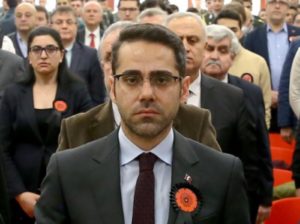
Tens of millions of dollars in bribes were transferred to key figures, including Fidan, then head of Turkish intelligence agency MIT; Fuat Oktay, then vice president; Süleyman Soylu, then interior minister; and Ömer Çelik, spokesperson for the ruling Justice and Development Party (AKP) and a long-time close associate of President Erdogan. This protection money and hush payments were funneled to the close family members and associates of these officials by various methods, including cash in bags, currency exchange houses and fraudulent payments to shell companies.
For instance, in the case of the foreign minister, his brother Sezgin Fidan, who has long been involved in organized crime, was used to transfer hush money to Hakan Fidan. Similarly, for former interior minister Soylu, his brother Sadık Soylu acted as an intermediary to facilitate the bribes. As for Ömer Çelik, Falyalı tapped his relative, Fatih Nevzat Aysu, to carry out the transactions.
Other officials, including prosecutors and judges who were supposed to investigate Falyalı’s criminal enterprises and oversee legal cases, were also bribed to dismiss any complaints submitted to judicial and law enforcement authorities or to drag cases out to fruitless conclusions.

According to the accountant, the entire system operated like a pyramid, with President Erdogan at the top, poised to receive the lion’s share of the profits from this huge criminal enterprise. Bribes were then distributed to other officials based on their seniority and level of involvement in protecting and facilitating Falyalı’s operations.
The drugs trafficked by Falyalı, particularly cocaine from Latin America, were picked up by speedboats off the coast of Cyprus and transported to Turkey’s Mersin port, under the protection of the Turkish navy, which controls the waters between Turkey’s Mediterranean coastline and northern Cyprus. The Turkish leg of the operation is overseen by Mehmet Ağar, a former interior minister, and his protégé Alaattin Çakıcı, a notorious mafia boss who controls criminal groups in Turkey.
Both the police department and MIT were involved in facilitating the drug trafficking route, moving the narcotics from Mersin port to Istanbul through the Turkish mainland, and from there, onward to Europe.
For a time, the system functioned smoothly until Erdogan realized he was being cheated out of his share and wasn’t fully informed about the transactions taking place in the currency exchanges. It was revealed that lower-ranking officials in the criminal hierarchy had run their own schemes to steal from the president’s share, downplaying the amount of money generated from the racketeering operation
Angry and betrayed, Erdogan intervened to dismantle the system, removing those he believed had cheated him out of his share. Soylu was dismissed from his cabinet position; Oktay lost the vice presidency; Fidan was ousted from his powerful intelligence agency post; and Maksut Serim was expelled from Erdogan’s office, no longer involved in managing the president’s secret slush fund.
While all these illegal dealings were unfolding, Falyalı safeguarded his position by recording telephone conversations with government officials and keeping secret sex tapes of compromising situations involving his VIP guests at the Les Ambassadeurs Hotel Casino & Marina in Kyrenia, Cyprus. He believed these tapes would provide leverage, allowing him to blackmail his partners if needed, gain the upper hand in negotiations and possibly even offer them as incentives to strike a deal with a foreign government should his relations with Turkish officials turn sour.
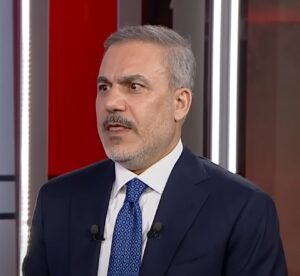
That insurance policy seemingly backfired when Falyalı’s associates in Turkey determined that he posed more of a risk than a benefit, ultimately becoming a liability. His extravagant lifestyle, coupled with public coverage of his lavish estate and the fleet of luxury cars owned by his family, also drew unwanted attention, an image that was far from desirable for his partners.
His partners were also concerned that the US Drug Enforcement Administration (DEA) was closing in on Falyalı after he and his brother Hüsnü were indicted by US federal authorities in July 2015 and faced arrest warrants on charges of drug trafficking and money laundering.
What is more, the family’s connections to Iran, through Ahmed Nazari Shirehjini — an Iranian accused of orchestrating a large-scale fake investment scam targeting European citizens — further attracted the attention of US and European law enforcement agencies
In the end, the Turkish cartel led by Ağar decided to eliminate him and sanctioned his murder. The criminal case surrounding his death was closed in August 2024, with only a few trigger men receiving prison sentences. The true masterminds who ordered the hit were never identified or prosecuted.
In December 2022, 10 months after Falyalı’s murder, Turkey launched an investigation into illegal betting enterprises, targeting his family members and their associates. The indictment, which was filed against around 230 individuals, appears to be little more than a face-saving measure by the Erdogan government, aiming to control the fallout, contain the damage and punish those who failed to adhere to the unspoken rules of engagement within the criminal enterprise.
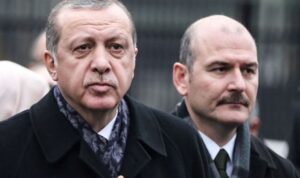
The judicial proceedings reflect a classic tactic often employed by the Erdogan government: issuing arrest warrants for potential whistleblowers who may have fled, using them as bargaining chips to extract additional protection money from mafia and criminal groups.
The tactic proved successful. After Falyalı’s death, his widow, Özge Taşker Falyalı, who was put in charge of maintaining the criminal enterprise, reportedly had to pay as much as 75 percent of the proceeds to Turkish officials in order to avoid legal trouble. Although she was indicted in Turkey, Özge was allowed to continue running the business and moved some operations to Dubai, where she owns multi-million dollar properties.
Turkey also used the legal case as an attempt to silence whistleblower Önal, seeking his extradition from the Netherlands. Ankara issued an arrest warrant that was distributed internationally through INTERPOL. Dutch authorities arrested him in December 2023 based on this warrant, but he was released on March 14, 2025, pending a court decision on the extradition request.
From his prison cell, Önal, fearing that a successful extradition might seal his fate in Turkey, began speaking to reporters. He exposed Falyalı’s criminal enterprise, sharing recordings that revealed how prosecutors and judges were bribed to shut down investigations and court cases. Önal is also believed to have provided information about Falyalı’s operations and the involvement of Turkish officials to Dutch authorities as well as to US officials investigating Falyalı’s drug empire.
The mystery surrounding Falyalı’s tape archive and who possesses the tapes today remains unresolved. Unconfirmed reports suggest that former Turkish ambassador Serim convinced the family to surrender the tapes, which were later handed over to Foreign Minister Fidan. However, the fate of some tapes, which allegedly show family members of top Turkish officials in compromising positions, remains unclear. Some believe that Fidan kept them in his personal vault, never shared them with President Erdogan and claimed they were unable to be retrieved.
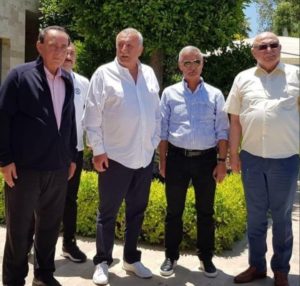
The Turkish opposition claims that Yasin Ekrem Serim, a former deputy foreign minister, was appointed as ambassador to the KKTC to resolve issues with the Falyalı family and collect around 45 sex tapes
Serim and his brother Ibrahim Serim, both educated at a university in Turkish-controlled northern Cyprus, had a longstanding relationship with Falyalı. They forged close ties with the drug lord, developed real estate projects and were involved in various commercial transactions, including property sales. In fact, in a firm called Northern Associates Trading Limited, registered in the KKTC, the Serim brothers were listed as partners along with Halil Falyalı.
The Serim brothers later sold their shares, and the company is now owned by Falyalı’s widow, Özge Taşker Falyalı, and her father, Mehmet Taşker. The company’s name was also changed to North Crown Residence and Unicat University Catering.
The Serim brothers still have active joint companies registered in northern Cyprus under different names, including HIS Trading Limited and Black Sea Development Limited.
The brothers also own four companies in the UK, either jointly or individually, under the names Marlowe College Limited, Damlar Investment Limited and LanguageUK Limited. Two other firms owned by the brothers — Dammax UK Limited and Serim Design Limited — were dissolved
Falyalı came to public attention in Turkey in May 2021, when notorious Turkish mob boss Sedat Peker, a former ally of Erdogan, alleged that the Turkish government was involved in international cocaine trafficking. Peker claimed that the drug was being shipped to Turkey from Venezuela and then transported to the Middle East on luxury yachts, with the profits being laundered in northern Cyprus by Falyalı.
According to Peker, Erkam Yıldırım, the son of ruling Justice and Development Party (AKP) politician and former prime minister Binali Yıldırım, along with Ağar and Falyalı, were running the cocaine operation, while then-interior minister Soylu allegedly provided them with immunity. The revenue was reportedly laundered through Falyalı’s casinos in Cyprus and online betting sites before being injected into Turkey’s economy.
Erkam Yıldırım, whose shipping line was used to transport drugs from Latin America, is now reportedly acting as a caretaker for the Falyalı criminal enterprise under the supervision of Ağar. Multi-billion dollar investments in the Netherlands by Yıldırım are said to have originated from this drug money.

